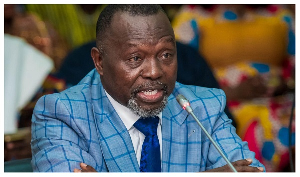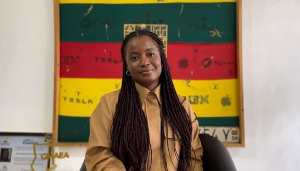The West Africa Centre for Crop Improvement (WACCI) of the University of Ghana (UG) – African Union (WACCI-AU) One Million Dollar Project for research on food and nutrition security has been launched in Accra.
The three-year project, which would be executed in Ghana, Burkina Faso and Nigeria, would enable WACCI to work with the public and private sectors of the three nations on Crop and Soil Health Improvement for sustainable Agricultural Intensification towards Economic Transformation in sub-Saharan Africa.
It aims at addressing issues related to the food and nutrition security objectives of the AU under its Competitive Research Grants Scheme supported by the European Union.
Professor Eric Y. Danquah, Founding Director, WACCI, said in 11 years the Centre has evolved from a small project funded by the Alliance for a Green Revolution in Africa (AGRA) at UG into the largest PhD in Plant Breeding Education Programme in Africa and one of the finest globally.
“Working with over 40 national, regional and international partners, WACCI equips the next generation of plant breeders and seed scientists with the knowledge and skills needed for Africa’s agricultural transformation,” he said.
Prof Danquah said the Centre, since its inception has enrolled 114 PhD students and 36 Master of Philosophy (MPhil) students from 18 African countries.
He said the Centre has churned out six cohorts of 52 PhD graduates who are transforming breeding programmes of National Agricultural Research Institutes in their home countries.
“Our seventh cohort of 14 students will graduate in July, bringing the number to 66,” he said.
Prof Danquah said the Centre is striving for strategic partnerships to address farmers’ needs in some of the most important stable crops such as maize, rice, cowpea and tomato in the West and Central Africa sub-region.
He praised Dr John S. Y. Eleblu, the Co-Principal Investigator of the WACCI-AU Project, and his entire project team for the hard work in ensuring that the Centre is successful in the grant application,
“While we think about this success, let’s look ahead with foresight and carefully put in place all the checks that we need t to meet expectations,” he said.
“Let’s ensure that we spend each dollar very well for the funds have been possible through the sweat and toil of the tax payer in Africa,” Prof Danquah said.
He said: “It is important that we subject our work to rigorous review as a Project Management team for a US$ 1 million grant is not a small grant even in the Land Grant Universities in the USA or at the Swedish University of Agricultural Sciences; where Prof Rodomiro Ortiz, a collaborator on the project comes from”.
“Let’s also remember that we shall be audited by external auditors and the need to keep accurate records and accounts is paramount. We cannot fail the African Union, we cannot fail the farmers, markets and industry, Prof Danquah said.
Activities under the WACCI-AU project include a maize breeding project in Ghana, tomato breeding programme in Nigeria, rice breeding programmes in Ghana and Burkina Faso, and a cowpea breeding programme in Ghana.
The objectives of the maize breeding programme are to screen adapted maize lines and varieties for the Maize Streak Virus (MSV) and Maize Lethal Necrosis (MLN) disease resistance using molecular markers.
It seeks to develop high yielding maize varieties that are resistant to MSV and MLN; and also to enhance farmers’ access to high yielding maize hybrids.
The tomato project seeks to improve tomato resistance to leaf miner pests in Nigeria.
The objectives of the rice project is to improve rice for increased productivity and also the production of breeder seed to meet the demand of foundation and certified seeds in both Ghana and Burkina Faso.
It would also see to the organisation of farmers’ field schools that focuses on Integrated Disease and Pest Management and Good Agriculture Practices in both Ghana and Burkina Faso.
The cowpea project would ensure cowpea’s generic resource development for the scientific community in the West Africa Sub-region.
Participants at the project inception workshop included Prof Rodomiro Ortiz of the Swedish University of Agricultural Sciences; Dr Maxwell Asante, Crops Research Institute, CSIR, Ghana; Dr Valantine Edgar Troare, INERA, Burkina Faso; and Dr Dorcas Ibitoye, National Institute for Horticultural Research, Nigeria.
The rest are Dr John Eleblu, Dr Agyemang Danquah, Dr Daniel Dzidzienyo, Dr Beatrice Ifie, Prof Kwadwo Ofori and Prof Pangirayi Tongoona all of WACCI.
In Ghana, the WACCI-AU project would go a long way to contribute to the successful implementation of the Government’s Planting for Food and Jobs Programme.
Business News of Tuesday, 26 June 2018
Source: ghananewsagency.org

















